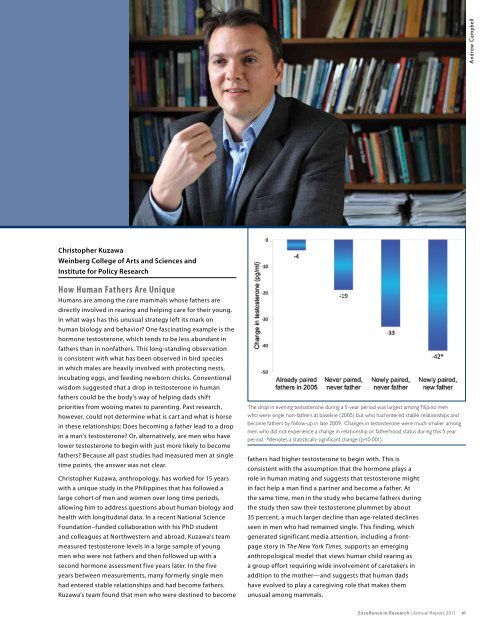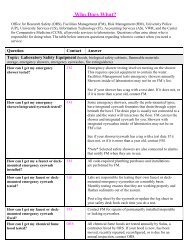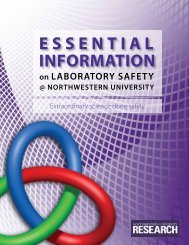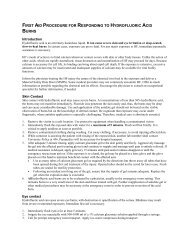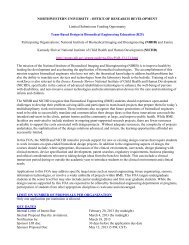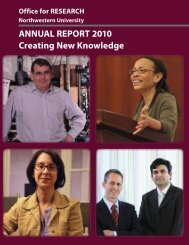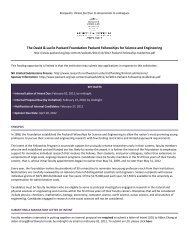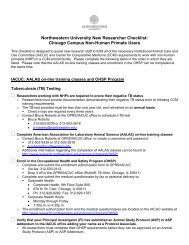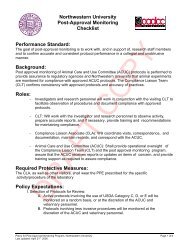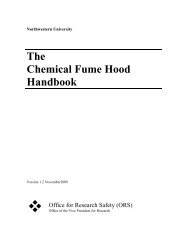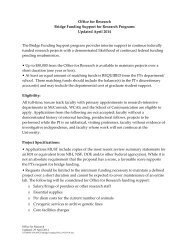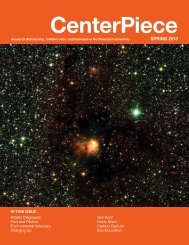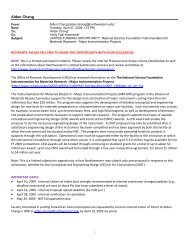annual report 2011 - Office for Research - Northwestern University
annual report 2011 - Office for Research - Northwestern University
annual report 2011 - Office for Research - Northwestern University
You also want an ePaper? Increase the reach of your titles
YUMPU automatically turns print PDFs into web optimized ePapers that Google loves.
Christopher Kuzawa<br />
Weinberg College of Arts and Sciences and<br />
Institute <strong>for</strong> Policy <strong>Research</strong><br />
How Human Fathers Are Unique<br />
Humans are among the rare mammals whose fathers are<br />
directly involved in rearing and helping care <strong>for</strong> their young.<br />
In what ways has this unusual strategy left its mark on<br />
human biology and behavior? One fascinating example is the<br />
hormone testosterone, which tends to be less abundant in<br />
fathers than in nonfathers. This long-standing observation<br />
is consistent with what has been observed in bird species<br />
in which males are heavily involved with protecting nests,<br />
incubating eggs, and feeding newborn chicks. Conventional<br />
wisdom suggested that a drop in testosterone in human<br />
fathers could be the body’s way of helping dads shift<br />
priorities from wooing mates to parenting. Past research,<br />
however, could not determine what is cart and what is horse<br />
in these relationships: Does becoming a father lead to a drop<br />
in a man’s testosterone? Or, alternatively, are men who have<br />
lower testosterone to begin with just more likely to become<br />
fathers? Because all past studies had measured men at single<br />
time points, the answer was not clear.<br />
Christopher Kuzawa, anthropology, has worked <strong>for</strong> 15 years<br />
with a unique study in the Philippines that has followed a<br />
large cohort of men and women over long time periods,<br />
allowing him to address questions about human biology and<br />
health with longitudinal data. In a recent National Science<br />
Foundation–funded collaboration with his PhD student<br />
and colleagues at <strong>Northwestern</strong> and abroad, Kuzawa’s team<br />
measured testosterone levels in a large sample of young<br />
men who were not fathers and then followed up with a<br />
second hormone assessment five years later. In the five<br />
years between measurements, many <strong>for</strong>merly single men<br />
had entered stable relationships and had become fathers.<br />
Kuzawa’s team found that men who were destined to become<br />
The drop in evening testosterone during a 5-year period was largest among Filipino men<br />
who were single non-fathers at baseline (2005) but who had entered stable relationships and<br />
become fathers by follow-up in late 2009. Changes in testosterone were much smaller among<br />
men who did not experience a change in relationship or fatherhood status during this 5 year<br />
period. *denotes a statistically signi�cant change (p


